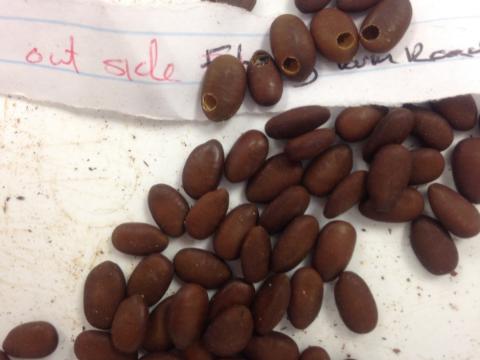Sara Elizabeth Salgado Astuoillo (MSc candidate)
Post release evaluation of Megabruchidius tonkineus (Coleoptera: Chrysomelidae: Bruchinae) a biological control agent for Gleditsia triacanthos L. (Fabaceae) in South Africa
Supervisors: Dr Grant Martin
Sara Elizabeth Salgado Astudillo, is an Ecuadorian who completed her undergraduate at the University of Zamorano in Honduras. She completed a internship at University of Florida on "Hypersensitive Response of the Exotic Plant, Brazilian Peppertree (Schinus terebinthifoliaRaddi) to Calophya spp under the guidance of Dr. Carey Minteer, Associate Professor of Entomology, the University of Florida Institute of Food and Agricultural Sciences Indian River Research and Education Center (UF/IFAS Indian River REC). Sara will join the CBC in early 2019 to start her Masters.
 |
|
Gleditsia triacanthos seeds, some damaged by Megabruchidius tonkineus |
Project background
Gleditsia triacanthos L. (Fabaceae) (Honey Locust) is a fast growing deciduous tree that is indigenous to North America. The tree has been introduced around the world, including South Africa, where it has become invasive. Wherever the tree establishes it competes with, and replaces indigenous species. Dense stands along watercourses significantly reduce stream flow. In South Africa it is regarded as Category 1b under the NEMBA regulations. Henderson and Wilson (2017) list it as being one of the nine fastest spreading weeds in South Africa and thus a species posing a significant environmental threat.
The tree is assumed to be primarily spread by seed and within waterbodies by stream flow, suggesting the seeds should be a target for biological control. In South Africa the seed feeding bruchid Megabruchidius tonkineus (Coleoptera: Chrysomelidae: Bruchinae) has been recorded in the plant’s seed pods. Although the insect was not released as part of a formal biological control programme but is an unintentional introduction it is still considered a biological control agent (Klein 2011). However, no host specificity nor impact studies were conducted on the species prior to its introduction into South Africa (Klein 2011). The impact of the weevil on the seeds of the tree may influence future management options. If the seed feeding brucid is not impacting the plant seeds sufficiently additional seed feeding biological control agents will be considered such as the damaging Amblycerus robiniae.
Project start date: 2019
Last Modified: Fri, 03 Aug 2018 09:59:58 SAST
